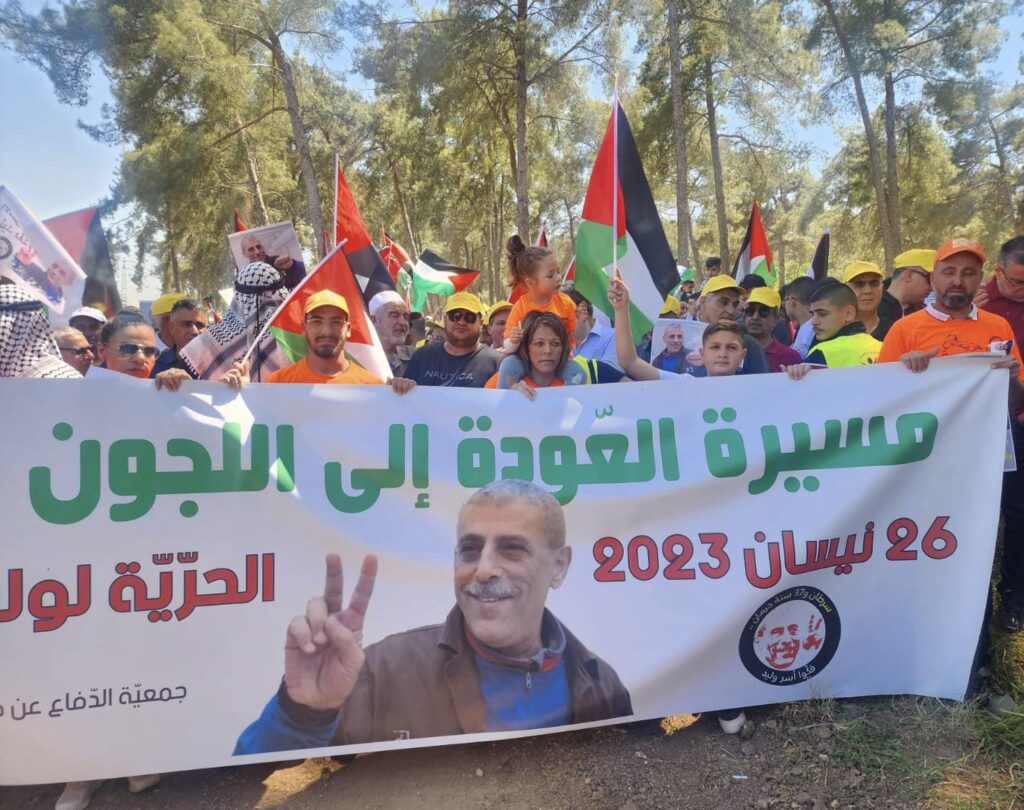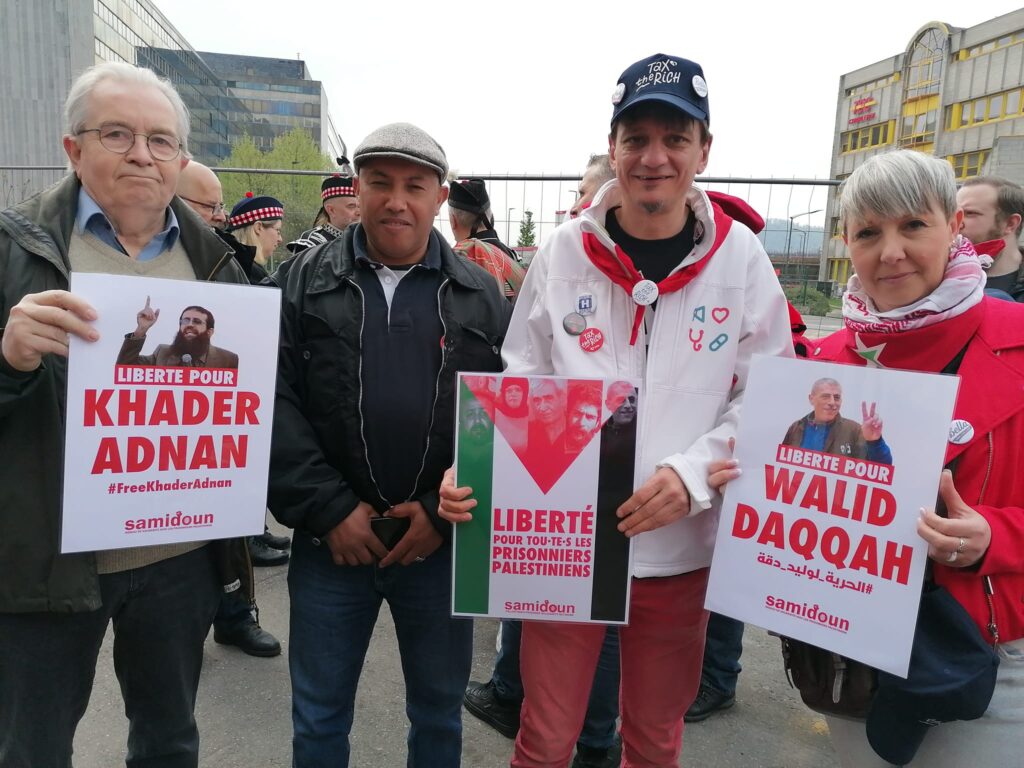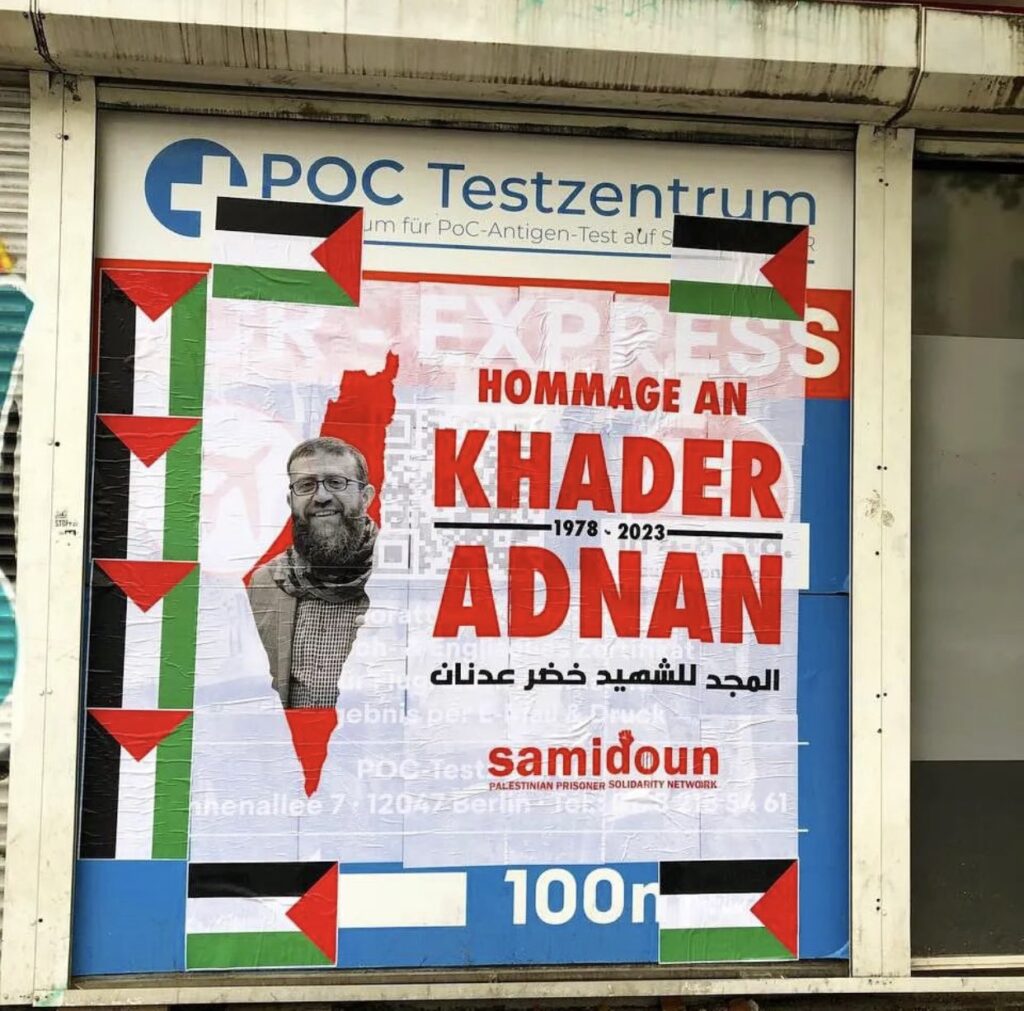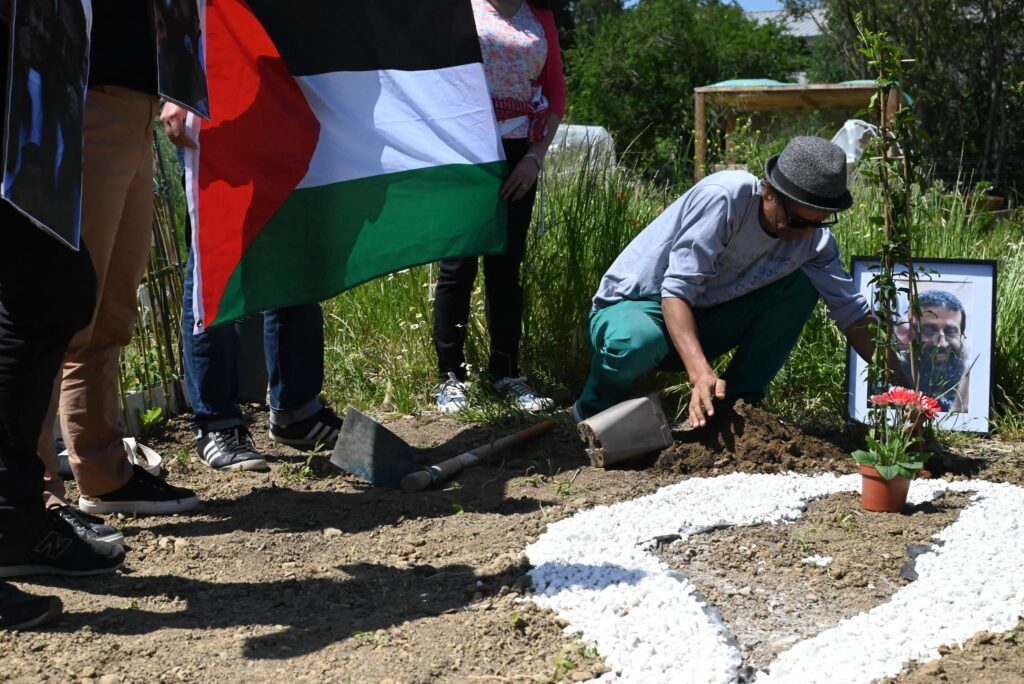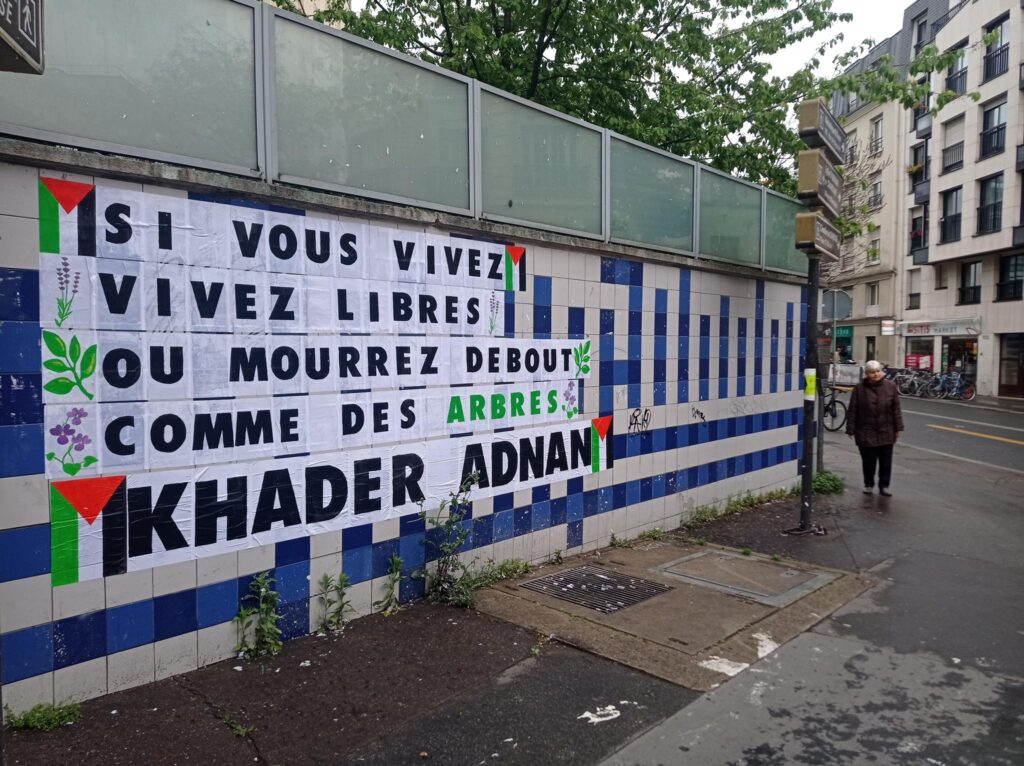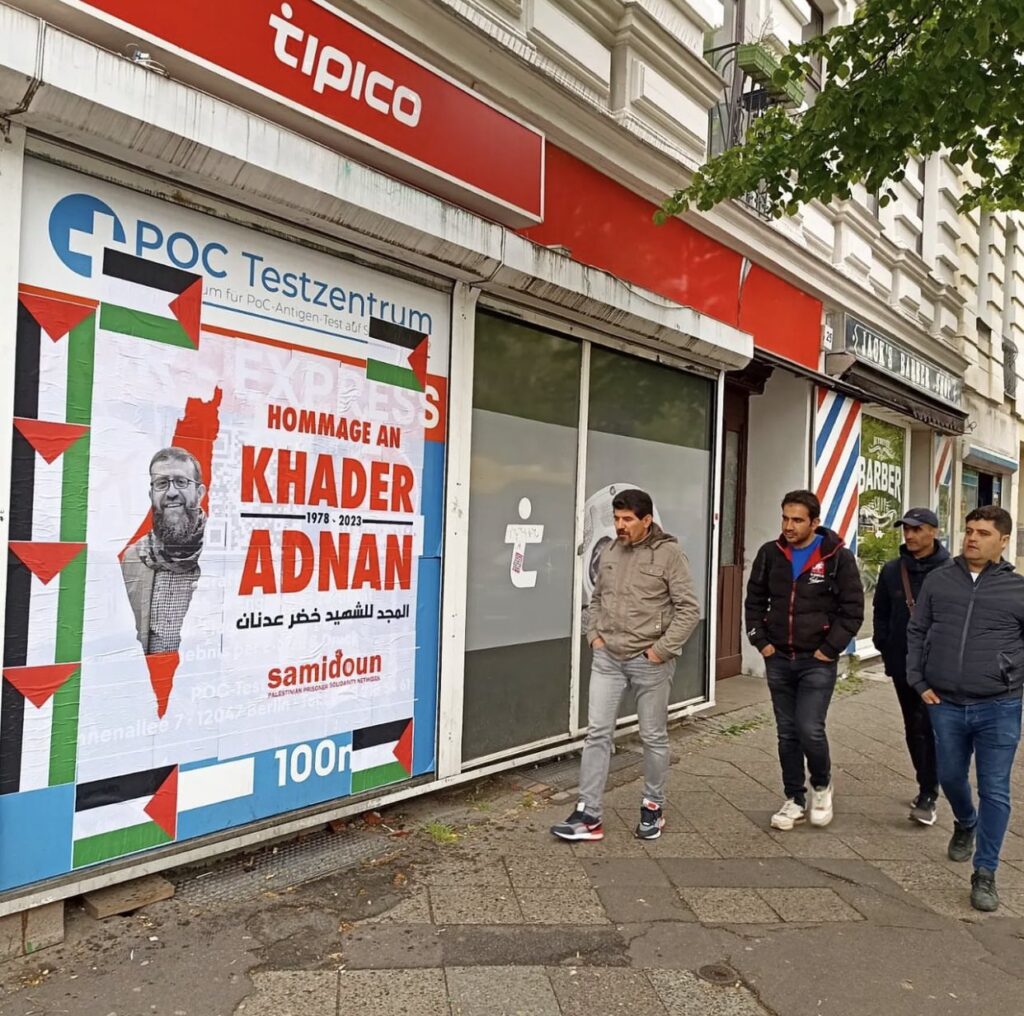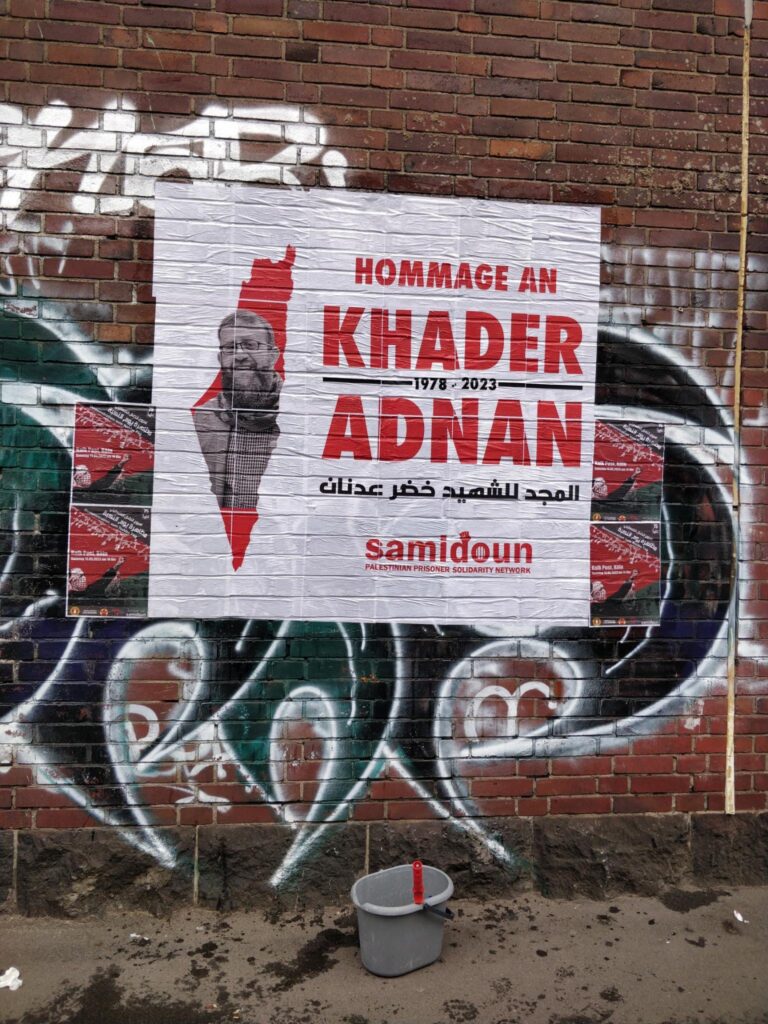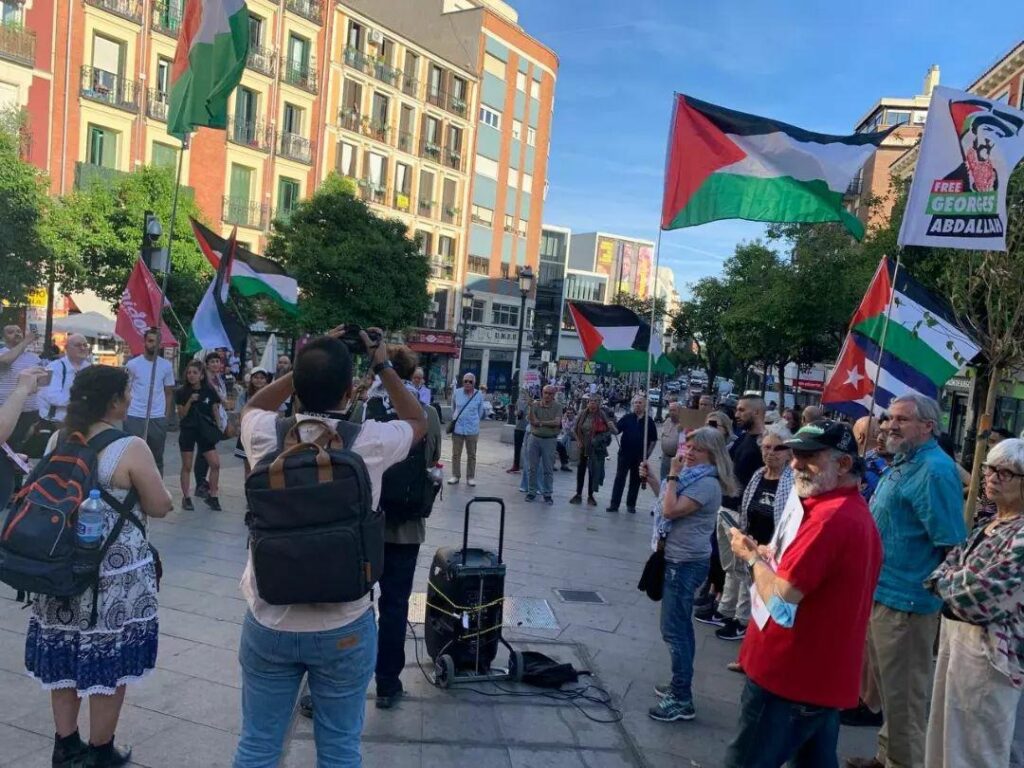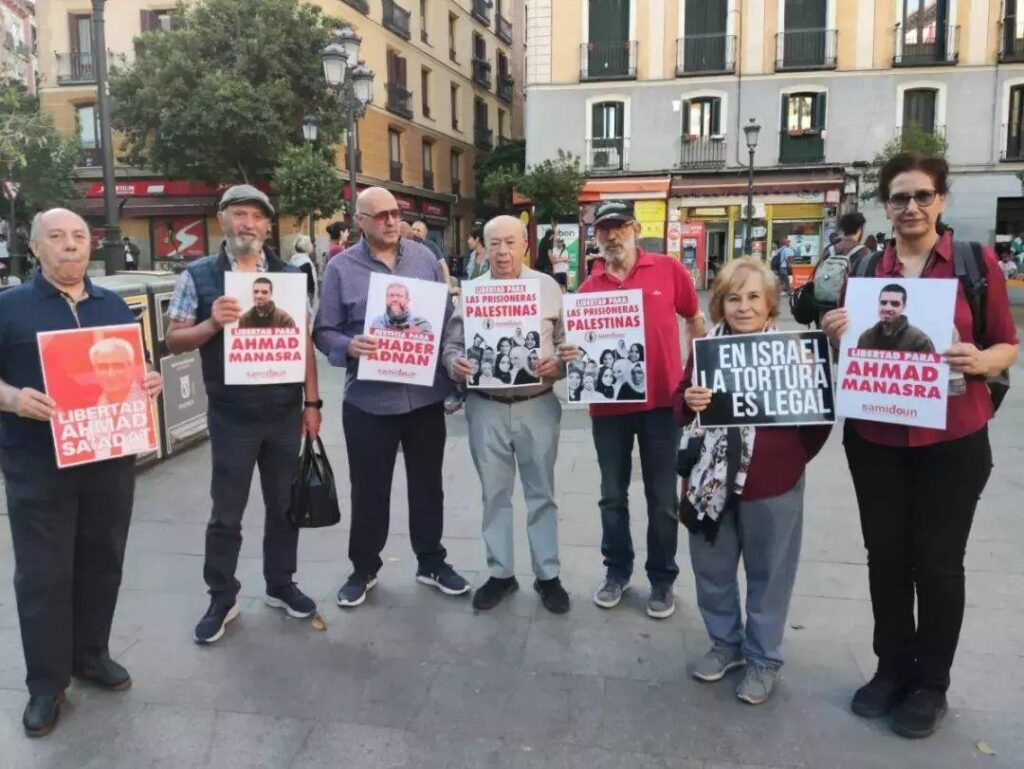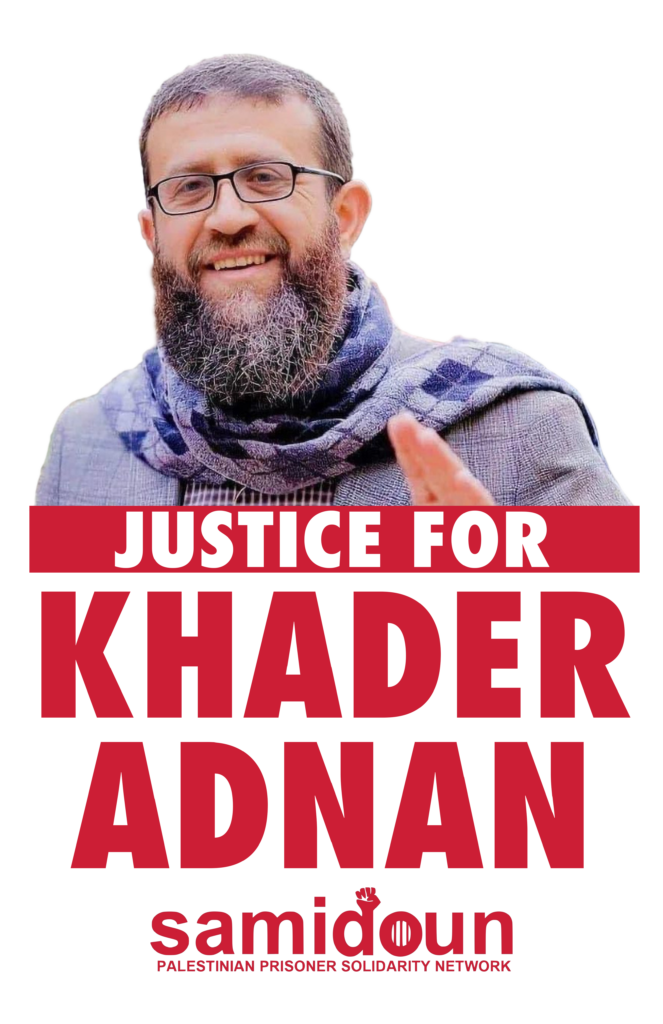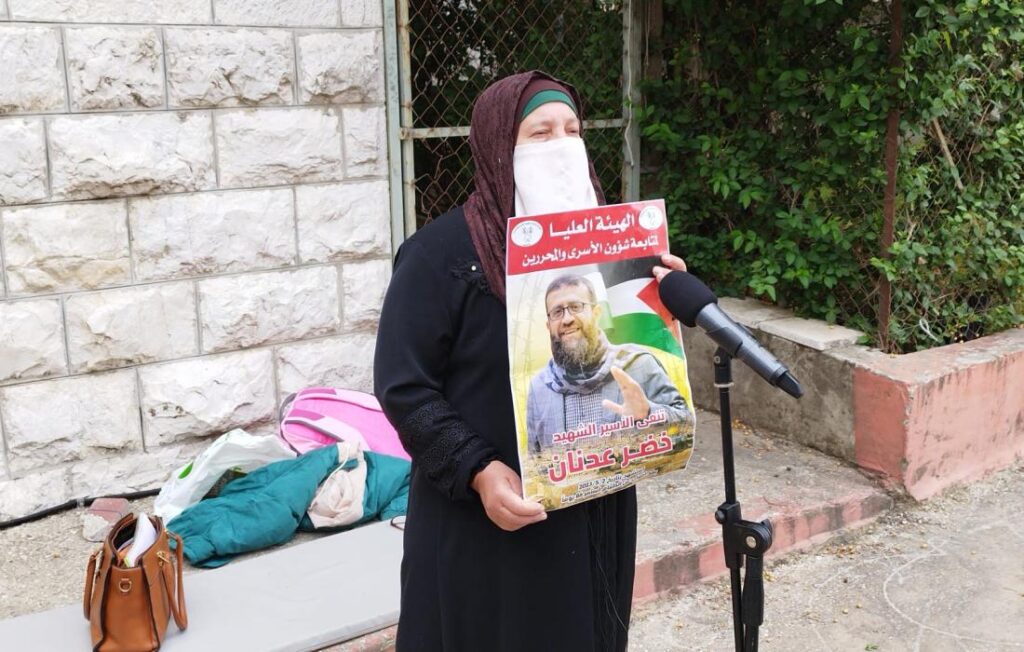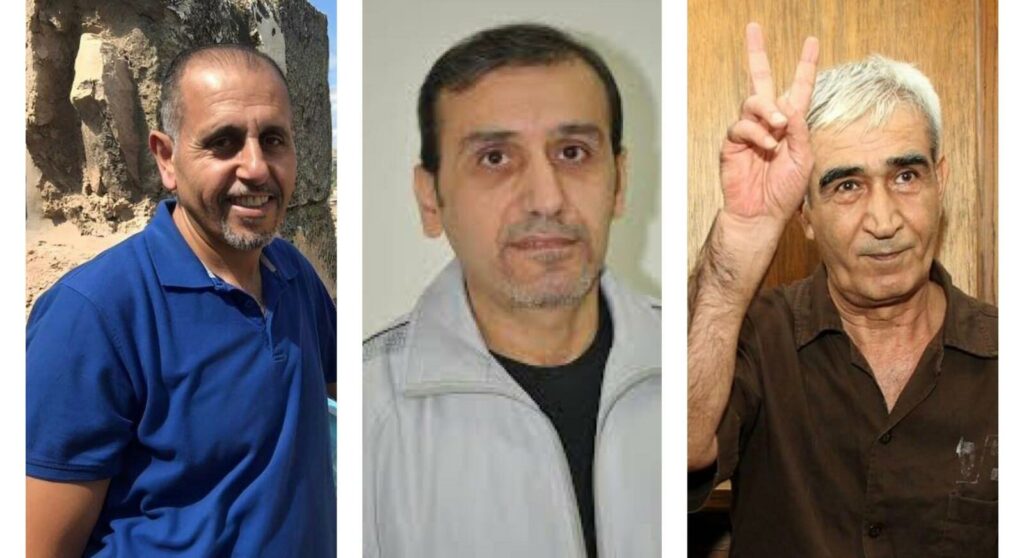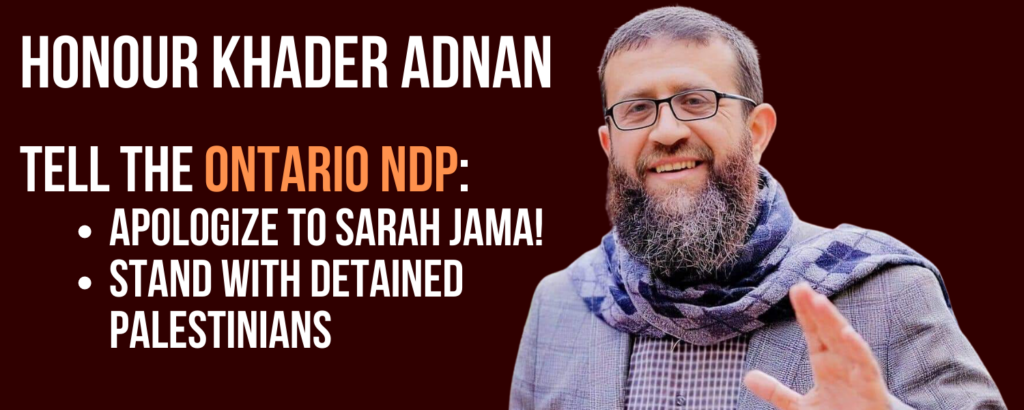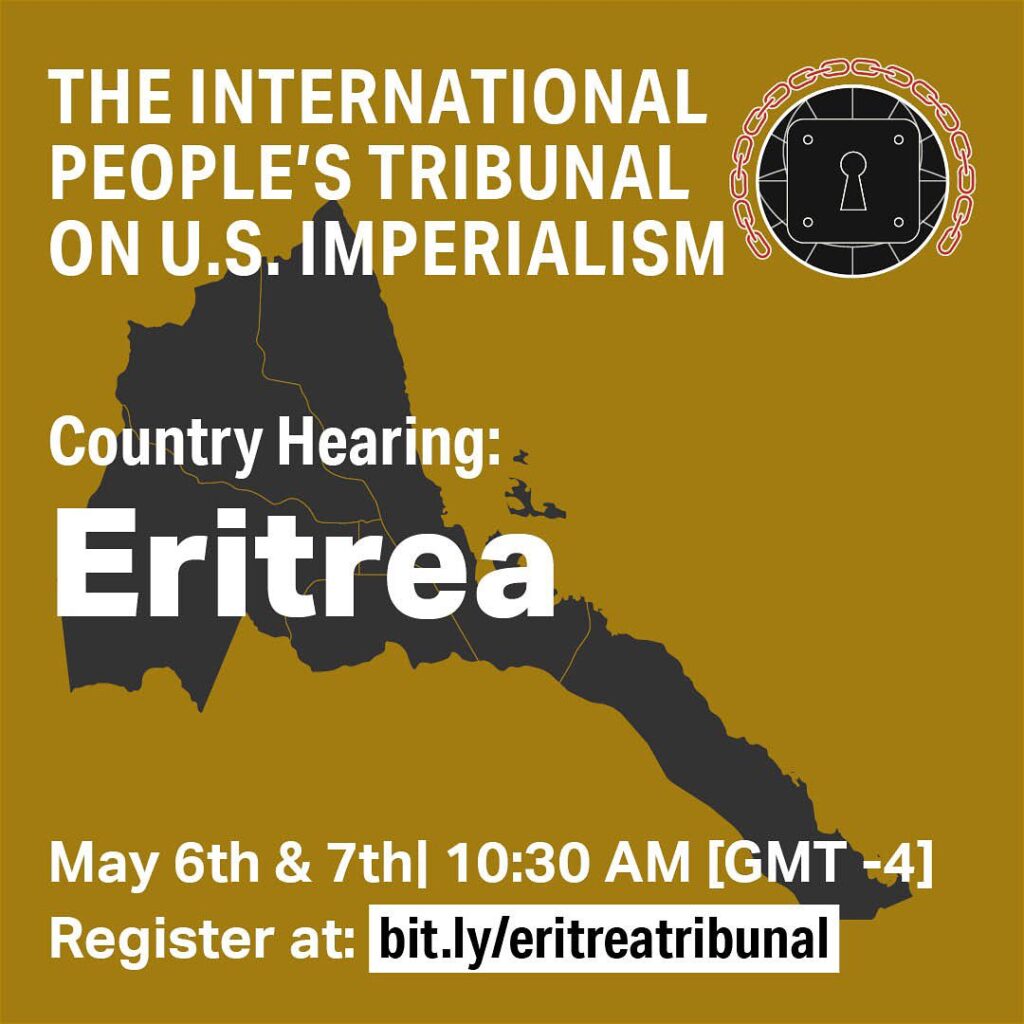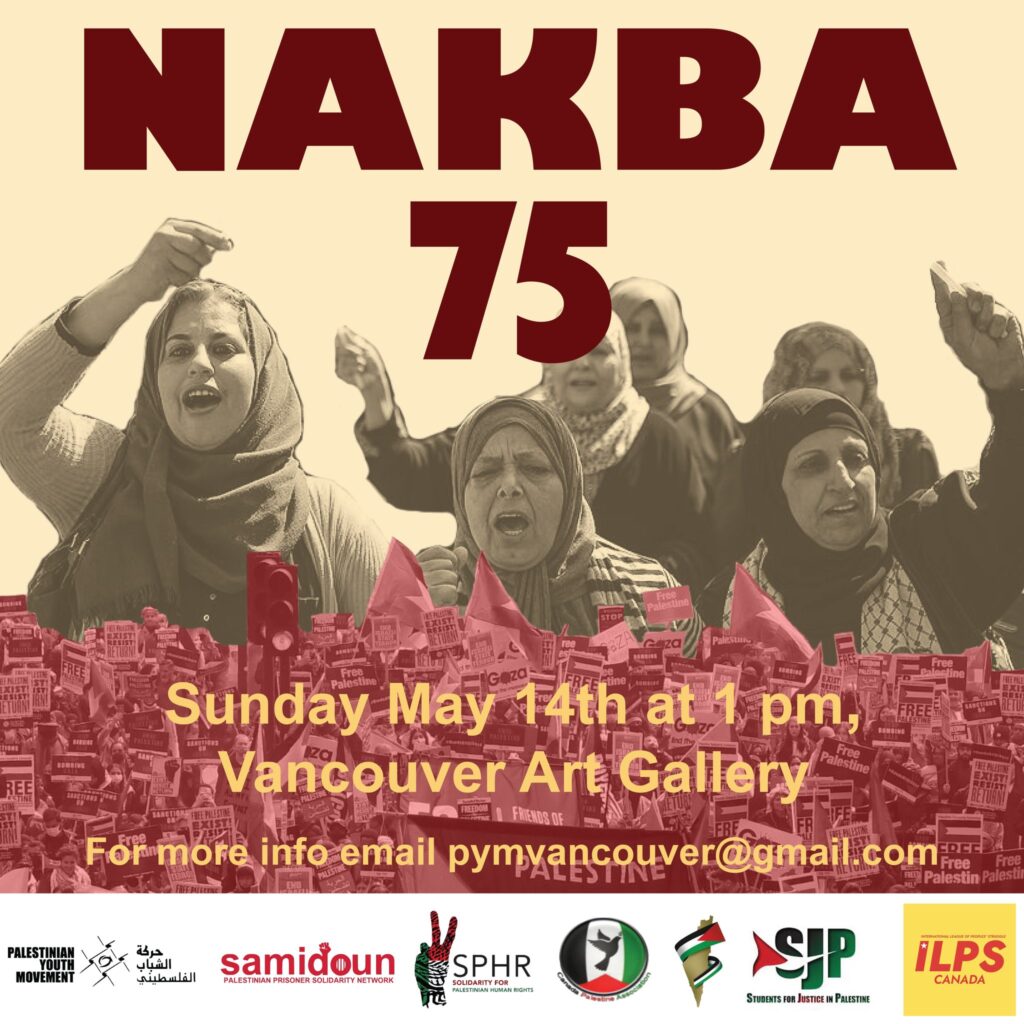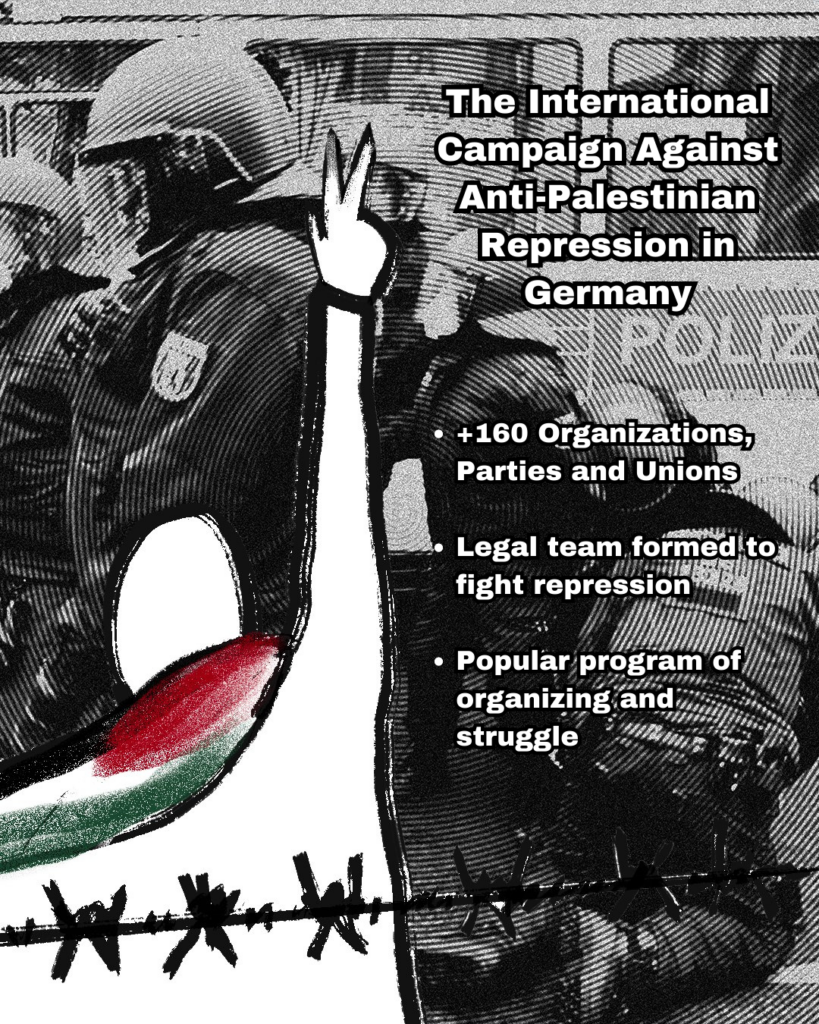
More than 160 organizations, unions, and political parties around the world joined the call issued by Samidoun Palestinian Prisoners Solidarity Network, as part of the “Revolutionary Solidarity Coalition”, against the extreme anti-Palestinian repression taking place in Germany.
To add your organization’s signature to the campaign, please click here.
Accompanying this international campaign, we formed a team of lawyers that will be undertaking the legal battle against the demonstration bans and the court cases for those who are targeted by the state for their struggle for a liberated Palestine. Support us and donate to:
Name: Rote Hilfe e.V.
IBAN: DE55 4306 0967 4007 2383 17
BIC: GENODEM1GLS
Note: Palaestina gegen Repression
The “Revolutionary Solidarity Coalition” consists of revolutionary and internationalist groups and organizations in Berlin that are engaged against imperialism in Germany and worldwide. The coalition was formed as a collective response against an array of extreme repressive tactics employed by the German state particularly in Berlin in May 2022.
These incidents of repression last year began with a nation-wide smear campaign against Palestinian organizing in April, the ban on Al Quds Day demonstrations on 29.04.2022, the ban of Soviet flags and communist symbols during the commemoration of the liberation of Berlin from Nazis by the Soviet Union on 08.05.2022, extreme repression and violence perpetrated by the German police against a Kurdish demonstration in Berlin on 14.05.2022, and the ban on all demonstrations commemorating the 74th year since the Palestinian Nakba (catastrophe) in the German capital. Nakba demonstrations mark the forcible displacement of well over 700,000 Palestinians from their homes and towns after a series of brutal massacres and atrocities all over historic Palestine by Zionist militias. The creation of this coalition was a natural response to the extreme repression against anti-imperialist struggle in Germany and comes from the deep understanding that the German state is part of the imperialist camp. Therefore, anti-imperialist movements have historically been and continue to be faced with intense state repression, including the targeting of organizing for justice in Palestine. The “Revolutionary Solidarity Coalition” responded to these repressive attacks in 2022 by taking to the streets despite the ban on Nakba day demonstrations under the motto “class struggle against repression” and decidedly chose to resist state repression. The direct action was later accompanied with an elaborate analysis of the repression attacks in May, multiple seminars, discussion rounds, and solidarity meetings, and the advancement of the coordination level between the member organizations throughout the past year.
This year, the German state is employing these tactics once again by launching a nationwide smear campaign against Palestinian organizing and Samidoun in particular, in clear coordination with Zionist institutions and the Israeli embassy. This smear campaign took the form of a week-long engagement of all mainstream/corporate German media in attacking Palestinian organizing in Germany, with the enthusiastic participation of German politicians. This campaign provided, again, the political cover for the German state to deploy a full ban on all demonstrations commemorating Palestinian Prisoners’ Day that were planned in Berlin on the 15th, 16th and 17th of April.
This attack also included the forcible dispersion of the Palestinian Prisoners’ Day demonstration in Cologne on 15 April for “supporting the resistance”. This barbaric repression against anti-imperialist struggle in Germany expresses itself as well in law 129, which is used by the German state to prosecute revolutionaries and anti-fascists in Germany, especially our Turkish and Kurdish comrades. It is also important to note that this repression in Germany comes in the context of increased repression all throughout Europe against Palestinian organizing: from the dissolution of Collectif Palestine Vaincra in Toulouse, France, to the prosecution of Palestine Action activists in the UK, to the smear campaign in the halls of the EU in March 2023 against activists and Palestinian and internationalist organizations all around Europe.
All of this represents an unacceptable attack on freedom of speech and assembly in Germany, specifically targeting Palestinian organizing and anti-imperialist movements.
We, in the Revolutionary Solidarity Coalition, are launching the international campaign against anti-Palestinian repression in Germany. This campaign will include international and local actions, popular mobilizations, and legal efforts, in order to confront German state repression and defend the rights of our people to protest, organize and struggle for the liberation of our homelands from US and European imperialism.
We also want to make three things clear:
1- This is an attack against all progressive and revolutionary forces. It is clear that the imperialist interests of the German state and its alliance with U.S. imperialism will always be put ahead of the oppressed and exploited communities in Germany. Struggling for social equality, environmental justice, the inalienable rights of the Kurdish people, against fascism in Turkey and US imperialism, and for the liberation of Palestine, serves the oppressed and exploited, while engaging in European and US imperialist projects worldwide, protecting the profits of big companies, collaborating with fascist politics in Turkey and elsewhere, engaging in NATO offensives and wars, and serving the interests of the Zionist entity internally and on the world stage, serves no one but German capital and bourgeoisie and the global imperialist camp.
2- We invite all progressive and revolutionary forces in Germany to join us in organizing this campaign. An organized, principled and coordinated left is the only deterrent against these repressive attacks. The formal German left’s capitulation and cowardice on Palestine strips it of any credibility as a meaningful counter-force and gives the German state free reign in unleashing all its repressive tools on one of the most oppressed sectors in Germany, the refugees.
3- Equating “Israel” with Judaism, and claiming that the atrocities of the Zionist entity are representative of all people of the Jewish faith, and painting all Jews with the blood of the Palestinian and Arab people massacred by this fascist regime is itself antisemitic. This notion that is propagated by Western powers and the Zionist entity, insisting on the ethno-nationalist “identity” of “Israel” is an insult to all of our progressive Jewish comrades who are fighting with us for the liberation of Palestine. Make no mistake, if the German state is truly interested in combating antisemitism, it would start with the Nazi groups within its military, police, and political circles. Instead, the state instrumentalises the fight against anti-Semitism as a repressive tool against all who stand with the Palestinian struggle, and to shift the blame of its Nazi crimes upon the Palestinians and Arabs in Germany. It is the Palestinian liberation movement, an anti-racist, anti-colonial movement, that rejects the equation between Zionism and Jewishness. And it is, therefore, the Palestinian liberation movement that is fighting against antisemitism, fascism and all forms of racism, not the German state.
As progressive forces, we will not be intimidated by their repression. Resistance can never be banned and we will take to the streets and stand united against their attacks.
To add your organization’s signature to the campaign, please click here.
Following is the statement signed by 160 organizations around the world against the anti-Palestinian repression taking place in Germany:
Against the attacks on Palestine organizing in Germany
We, the undersigned organizations, declare our rejection and outrage at the Berlin police’s ban on commemorations of Palestinian Prisoners’ Day on the weekend, 15 – 17 April. This ban is an attack not only on the Palestinian and Arab community in Berlin and supporters of Palestine, it is a threat targeting all of our freedom of expression. Beyond this, it is an attempt to silence support for the 4800 Palestinian prisoners themselves, struggling from beyond colonial bars for their freedom.
This police ban is a reflection of anti-Palestinian racism and repression. Rather than opposing anti-Semitism, the rationale for the ban actually embraces the anti-Semitic equation that Zionism and Judaism are identical and that the Israeli occupation regime is the representative of Jews. Furthermore, it is clear that the government has no regard for the public safety of the Palestinian and Arab community in Berlin – the largest such community in Europe – and does not hesitate to instrumentalize racism and smear campaigns in order to impose a form of collective punishment on the community.
We view this ban as an attack first and foremost on the Palestinian prisoners and on the Palestinian community in Berlin as well as an attempt to silence the rising support for Palestine in Germany and around the world. Many people are increasingly aware of and appalled by the crimes of the Israeli occupation regime in Palestine and are raising their voices against it, and this is what the ban aims to stop.
Further, we view this as a repeat of the May 2022 ban on commemorations of al-Nakba, and warn against another such ban in 2023, the 75th commemoration of the Nakba. These bans are an expression of state-sponsored anti-Palestinian racism and a full identification with Israeli colonization of occupied Palestine. This is particularly important as the vast majority of the Palestinian community in Berlin are refugees denied their right to return home for the past 75 years.
We reject these bans on demonstrations for Palestinian prisoners’ day and declare that our voices will not be silenced. We must shout, louder than ever, for the release of all Palestinian prisoners locked in Israeli regime jails, and for the liberation of Palestine, from the river to the sea. And we declare, clearly and firmly, that this form of state repression will not succeed in silencing our support for the Palestinian people, their resistance and their prisoners’ movement struggling to end colonialism and racism.
From the river to the sea, Palestine will be free! Free all Palestinian prisoners! Down with state repression; long live international solidarity!
SIGN UP: https://forms.gle/8RqifeX46EwinzD96
SIGNATORIES
- 100 Idee per la Pace, Italy
- ACTA, France
- AFPS 63 (Association France Palestine Solidarité 63), France
- AFPS Grenoble, France
- Al Yudur Palestinian Youth, Spain
- Al-Awda PRRC, United States
- Anti Capitalistas, Catalunya
- Anti Imperialist front, International
- Anticapitalistas (Spanish state)
- Asociación Americana de Juristas, International
- Association for Investment in Popular Action Committees, United States
- Association France Palestine Solidarité Nîmes, France
- Barcelona En Comú, Catalonia
- BDS Vancouver/Coast Salish Territories, Canada
- Belgian Academics and Artists for Palestine (BAA4P), Belgium
- Black Alliance for Peace Solidarity Network, United States/International
- Bruxelles Panthères, Belgium
- Campagne Civile Internationale pour la Protection du Peuple Palestinien (CCIPPP34), France
- Canada Palestine Association
- Canada-Philippines Solidarity for Human Rights
- Canadian BDS Coalition
- CAPJPO – EuroPalestine, France
- CASI (Committee of Anti-Imperialists in Solidarity with Iran), United States/International
- Center for the Study and Preservation of Palestine, United States
- Centre for Counter Hegemonic Studies, Australia
- CGT Metal Madrid, Spanish state
- CGT Salamanca, Spanish state
- Charente Palestine Solidarité, France
- Chrysalis Theatre, Canada
- CJPME Saskatoon, Canada
- Collectif Georges Ibrahim Abdallah 38, France
- Collectif Palestine Vaincra, France
- Contrahegemonía-Argentina
- CSTEC STEs (IAC) Catalunya
- Dar al Janub, Austria
- Democratic Lawyers Association of Bangladesh
- Diputado Unidos Podemos, Enrique Santiago Romer, Spanish state
- Dones X Dones, Spanish state
- Early Childhood Development Intercultural Partnerships Program, Canada
- EATIP, Argentina
- Éirígí – For A New Republic, Ireland
- Fédération Syndicale Étudiante, France
- Free Palestine Maastricht, Netherlands
- Free Palestine Movement, United States/International
- Freedom Road Socialist Organization, United States
- Frente Antiimperialista Internacionalista, International
- Friends of the Filipino People in Struggle, International
- Front de Libération Décolonial, France
- GABRIELA BC, Canada
- Gaza Solidarity Group, Canada
- Greater Toronto 4 BDS, Canada
- Green Mountain Solidarity With Palestine, United States
- Groupe Non-Violent LOUIS LECOIN, Luxembourg
- Grupo Libélulas, Spanish state
- Human Rights for All ( HR4A) Saskatchewan, Canada
- ICAHD-USA
- IJAN International Jewish Anti-Zionist Network, International
- Indiana Center for Middle East Peace, United States
- Institut für Palästinakunde e.V., Germany
- International Action Center, United States
- International Center for Palestine Studies, Netherlands
- International prisoner’s network Belgium
- International Women’s Alliance (IWA), International
- Intersindical Alternativa de Catalunya
- Izquierda Unida, Spain
- Izquierda Unida, coordinador en grupo parlamentario Mauricio Valiente Ots
- Jericho Boston, United States
- Jewish Network for Palestine, Britain
- Jewish Socialist Bund, Quebec/Canada
- Jews for Palestinian Right of Return, United States
- Jüdisch-Palästinensische Dialoggruppe München, Germany
- Just Peace Advocates, Canada
- Juventud Chileno-Árabe por Palestina de Valdivia, Chile
- JVP Central Ohio, United States
- Kairos Sabeel Foundation Netherlands
- Kenyans For Tax Justice, Kenya
- Kommunistische Organisation, Germany
- League of Filipino Students PUP, Philippines
- Libérons Georges Abdallah 38, France
- Liga Internacional Socialista (LIS-ISL), International
- Lluita internacionalista, Catalunya
- Manu Pineda – Member of the European Parliament (The Left – GUE/NGL)
- Masar Badil, Palestinian Alternative Revolutionary Path Movement, Palestine/International
- MD2Palestine, United States
- Middle East Crisis Response, United States
- Migrante BC, Canada
- Migrante NL, Netherlands
- Migrantifa Mainz, Germany
- Migrantifa NRW , Germany
- Montagsdemonstration Stuttgart, Germany
- Mouvement Citoyen Palestine, Belgium
- MRAP33, France
- MST en el Frente de Izquierda Unidad, Argentina
- Münchner Friedensbündnis, Germany
- National Lawyers Guild International Committee, United States
- National Lawyers Guild Palestine Subcommittee, United States
- National Students for Justice in Palestine, United States
- National Union of Peoples’ Lawyers – Philippines
- New Buffalo Center, United States
- New York City Jericho Amnesty Movement, United States
- Niagara Movement for Justice (NMJPI), Canada
- NorCal ISM, United States
- North New Jersey DSA BDS and Palestine Solidarity Working Group, United States
- Nouveau Parti Anticapitaliste, France
- Nouveau Parti Anticapitaliste 31, France
- Oakville Palestinian Rights Association, Canada
- Ongd AFRICANDO, Senegal
- Orléans Loiret Palestine, France
- Palästina Spricht , Germany
- Palästinakomitee Stuttgart e.V., Germany
- Palestina Komitee Rotterdam , Netherlands
- Palestina Libre de Murcia, Spanish state
- Palestinian and Jewish Unity (PAJU), Canada – Quebec
- Partido comunista de España
- Party of Communists USA
- Peace & Planet News, United States
- Pinay Sa Holland- Gabriela , Netherlands
- Plate-forme Charleroi-Palestine, Belgium
- Radical Solidarity, Netherlands
- Resistance News Network, International
- Responsable de relaciones internacionales de Izquierda Unida, Jon Rodriguez Forrest (Spain)
- Resumen Latinoamericano prensa, International
- Rete Romana di Solidarietà con il Popolo Palestinese, Italy
- REVOLUTION, Germany
- Révolution Permanente, France
- Revolutionaire Eenheid, Netherlands
- Revolutionäre Internationalistische Organisation / Klasse gegen Klasse, Germany
- Revolutionärer Jugendbund, Germany
- Revolutionary Communist Group – Fight Racism! Fight Imperialism!, Britain
- Roter Ring, Germany
- Samidoun Palestinian Prisoner Solidarity Network, International
- Scottish Jews Against Zionism, Scotland
- Secours Rouge Genève, Switzerland
- Secours Rouge Montréal, Quebec
- Secours Rouge Toulouse, France
- SELondonFriendsOfPalestine, Britain
- Sindicato Solidaridad Obrera, Spanish state
- Solidarität International (SI) e.V., Germany
- Solidaritätsnetzwerk Berlin, Germany
- Stop the War Machine, United States
- Students for Justice in Palestine Amsterdam, Netherlands
- Sulong UBC, Canada
- SUPER-UW, United States
- The Key (Palestine)
- The Moroccan Front to support Palestine and against normalization, Morocco
- UK-Palestine Mental Health Network, Britain
- Unidas Podemos-Galicia en Común, Spanish state
- Union Juive Française pour la Paix (UJFP), France
- Unité Communiste, France
- United National Antiwar Coalition (UNAC), United States
- US Boats to Gaza
- US Campaign for the Academic and Cultural Boycott of Israel (USACBI(
- Venceremos, Partido de Trabajadorxs, Argentina
- Veterans for Peace, United States
- Veterans For Peace Chapter 72, United States
- VIB, VIVA Intifada Berlin, Germany
- Vita Books, Britain
- V-SB, Belgium/Flanders
- Women Against Military Madness, United States
- Women for Filipino Women and Children, Netherlands
- Workers Voice Socialist Movement, United States
- Workers World Party, United States
